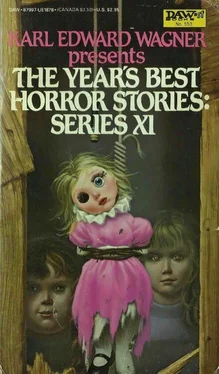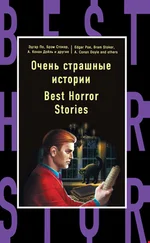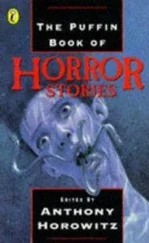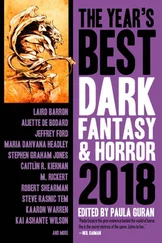The room appeared to have grown much darker when he woke in the grip of utter panic.
He didn’t dare move, not until he knew what was wrong. The shadows were frozen above him, the curtains hung like sheets of lead. His mouth tasted metallic, and made him think of blood. He was sure that he was alone in the dark. The worst of it was that there was something he mustn’t do—but he had no idea what it was.
He’d begun to search his mind desperately when he realized exactly what he ought not to have done. The threat had been waiting in his mind. The thought which welled up was so atrocious that his head began to shudder. He was trying to shake out the thought, to deny that it was his. He grabbed the light cord, to scare it back into the dark.
Was the light failing? The room looked steeped in dimness, a grimy fluid whose sediment clung to his eyes. If anything the light had made him worse, for another thought came welling up like bile, and another. They were worse than the atrocities which the house had seen. He had to get out of the house.
He slammed his suitcase—thank God he’d lived out of it, rather than use the wardrobe—and dragged it onto the landing. He was halfway down, and the thuds of the case on the stairs were making his scalp crawl, when he realized that he’d left a notebook in the living room.
He faltered in the hallway. He mustn’t be fully awake: the carpet felt moist underfoot. His skull felt soft and porous, no protection at all for his mind. He had to have the notebook. Shouldering the door aside, he strode blindly into the room.
The light which dangled spiderlike from the central plaster flower showed him the notebook on a fat armchair. Had the chairs soaked up all that had been done here? If he touched them, what might well up? But there was worse in his head, which was seething. He grabbed the notebook and ran into the hall, gasping for air.
His car sounded harsh as a saw among the sleeping houses. He felt as though the neat hygienic facades had cast him out. At least he had to concentrate on his driving, and was deaf to the rest of his mind. The road through Liverpool was as unnaturally bright as a playing Field. When the Mersey Tunnel closed overhead he felt that an insubstantial but suffocating burden had settled on his scalp. At last he emerged, only to plunge into darkness.
Though his sleep was free of nightmares, they were waiting whenever he jerked awake. It was as if he kept struggling out of a dark pit, having repeatedly forgotten what was at the top. Sunlight blazed through the curtains as though they were tissue paper, but couldn’t reach inside his head. Eventually, when he couldn’t bear another such awakening, he stumbled to the bathroom.
When he’d washed and shaved he still felt grimy. It must be the lack of sleep. He sat gazing over his desk. The pebbledashed houses of Neston blazed like the cloudless sky; their outlines were knife-edged. Next door’s drain sounded like someone bubbling the last of a drink through a straw. All this was less vivid than his thoughts—but wasn’t that as it should be?
An hour later he still hadn’t written a word. The nightmares were crowding everything else out of his mind. Even to think required an effort that made his skin feel infested, swarming.
A random insight saved him. Mightn’t it solve both his problems if he wrote the nightmares down? Since he’d had them in the house in West Derby—since he felt they had somehow been produced by the house—couldn’t he discuss them in his book?
He scribbled them out until his tired eyes closed. When he reread what he’d written he grew feverishly ashamed. How could he imagine such things? If anything was obscene, they were. Nothing could have made him write down the idea which he’d left until last. Though he was tempted to tear up the notebook, he stuffed it out of sight at the back of a drawer and hurried out to forget.
He sat on the edge of the promenade and gazed across the Dee marshes. Heat-haze made the Welsh hills look like piles of smoke. Families strolled as though this were still a watering place; children played carefully, inhibited by parents. The children seemed wary of Miles; perhaps they sensed his tension, saw how his fingers were digging into his thighs. He must write the book soon, to prove that he could.
Ranks of pebbledashed houses, street after street of identical Siamese twins, marched him home. They reminded him of cells in a single organism. He wouldn’t starve if he didn’t write—not for a while, at any rate—but he felt uneasy whenever he had to dip into his savings; their unobtrusive growth was reassuring, a talisman of success. He missed his street and had to walk back. Even then he had to peer twice at the street name before he was sure it was his.
He sat in the living room, too exhausted to make himself dinner. Van Gogh landscapes, frozen in the instant before they became unbearably intense, throbbed on the walls. Shelves of Miles’ novels reminded him of how he’d lost momentum. The last nightmare was still demanding to be written, until he forced it into the depths of his mind. He would rather have no ideas than that.
When he woke, the nightmare had left him. He felt enervated but clean. He lit up his watch and found he’d slept for hours. It was time for the Book Programme. He’d switched on the television and was turning on the light when he heard his voice at the far end of the room, in the dark.
He was on television, but that was hardly reassuring; his one television interview wasn’t due to be broadcast for months. It was as though he’d slept that time away. His face floated up from the gray of the screen as he sat down, cursing. By the time his book was published, nobody would remember this interview.
The linkman and the editing had invoked another writer now. Good God, was that all they were using of Miles? He remembered the cameras following him into the West Derby house, the neighbors glaring, shaking their heads. It was as though they’d managed to censor him, after all.
No, here he was again. “Jonathan Miles is a crime novelist who feels he can no longer rely on his imagination. Desperate for new ideas, he lived for several weeks in a house where, last year, a murder was committed.” Miles was already losing his temper, but there was worse to come; they’d used none of his observations about the creative process, only the sequence in which he ushered the camera about the house like Hitchcock in the Psycho trailer. “Viewers who find this distasteful,” the linkman said unctuously, “may be reassured to hear that the murder in question is not so topical or popular as Mr. Miles seems to think.”
Miles glared at the screen while the program came to an end, while an announcer explained that “Where Do You Get Your Ideas?” had been broadcast ahead of schedule because of an industrial dispute. And now here was the news, all of it as bad as Miles felt. A child had been murdered, said a headline; a Chief Constable had described it as the worst case of his career. Miles felt guiltily resentful; no doubt it would help distract people from his book.
Then he sat forward, gaping. Surely he must have misheard; perhaps his insomnia was talking. The newsreader looked unreal as a talking bust, but his voice went on, measured, concerned, inexorable. “The baby was found in a microwave oven. Neighbors broke into the house on hearing the cries, but were unable to locate it in time.” Even worse than the scene he was describing was the fact that it was the last of Miles’ nightmares, the one he had refused to write down.
Couldn’t it have been coincidence? Coincidence, coincidence, the train chattered, and seemed likely to do so all the way to London. If he had somehow been able to predict what was going to happen, he didn’t want to know—especially not now, when he could sense new nightmares forming.
Читать дальше












